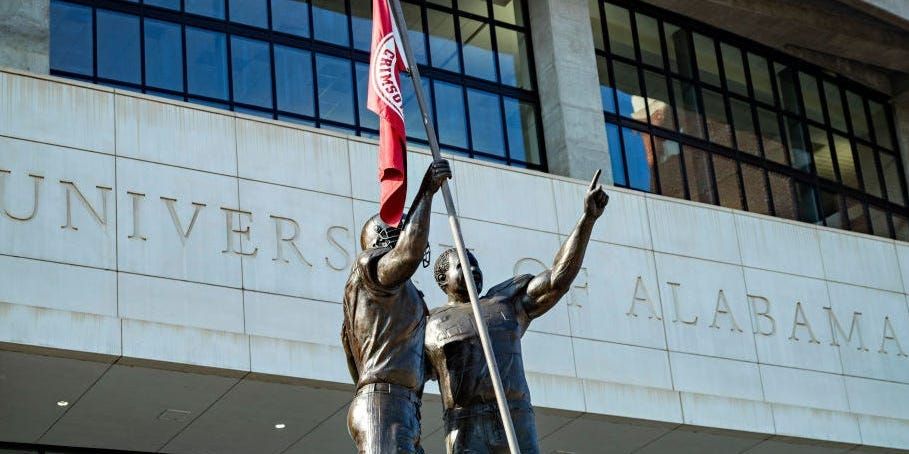[ad_1]
Wesley Hitt / Getty Images
The University of Alabama told professors to not tell students about classmates who had tested positive for COVID-19, reported the Daily Beast.
The university made headlines this week after more than 500 people tested positive for COVID-19 within 6 days of opening.
Professors, staff, and students told the Daily Beast they worry for their safety, as students are quarantining on campus unsupervised.
The university is just one of several schools that have made headlines as students returned to campuses throughout August and sparked new clusters of coronavirus infections.
Visit Insider’s homepage for more stories.
Professors at the University of Alabama’s politics department were explicitly told to not tell students if their fellow classmates have been infected with COVID-19 in an email this week, the Daily Beast reported.
The university made headlines earlier this week when over 500 students, faculty, and staff members tested positive for COVID-19 just six days after opening its campus.
Despite the growing number of COVID-19 cases, university officials sent an email instructing professors “Do not tell the rest of the class,” with “not” underlined.
The rest of the email says that students who test positive for COVID-19 are not exposure risks if they wear masks and social distance. In an email sent Tuesday, University Provost James Dalton cited “privacy reasons” for asking professors to keep quiet about cases in their classes.
“If the established rules for masks and physical distancing are followed in the classroom, then the risk of transmission from the positive student is minimal, and it is not necessary to inform the rest of the class they may have been in the same room as a positive classmate,” Dalton wrote, according to the Daily Beast. “For privacy reasons, the instructor should not announce to the class that a student in the class tested positive, even anonymously.”
According to the Daily Beast, university officials may not warn professors or students if a student tests positive for COVID-19 and continues to attend class. The report also said other departments in the university received similar emails stating if a professor tells students about a classmate who has tested positive, even in broad terms that protect the student’s identity, they could face HIPAA violation charges.
Story continues
Masks and social distancing reduce the transmission of COVID-19, but they are not perfectGraduating Masters students from the Columbia University Graduate School of Architecture, Planning and Preservation (GSAPP) gather the day before their online graduation ceremony in New York City, May 15, 2020.
Andrew Kelly/Reuters
While wearing masks can reduce the spread of COVID-19, it is important to note they are not fool-proof and not all masks are made equally.
Cloth masks may reduce the likelihood of spreading large droplets when people talk, cough or sneeze, they do not filter tiny particles in the way N95 respirators do. Enclosed, indoor areas in particular, like classrooms, can especially facilitate the spread of COVID-19 more easily than outdoor spaces.
“A lot of my colleagues and people I’ve talked to, they’re terrified,” Michael Innis-Jimenez, an American studies professor, told the Daily Beast.
Students who test positive on campus are directed to immediate help, but those off-campus may have to wait two days
According to the Daily Beast, students who test positive and live on campus are directed to the COVID Support Program immediately, and help reaches out as soon as the university is informed of the positive test.
Students are then quarantined in special isolation rooms on campus.
But for those who test positive and live off campus, help can take up to 48 hours, as off-campus students are instead told to call a COVID-19 hotline.
Those quarantined on campus are expected to remain in their rooms on an “honor system,” but multiple students told the Daily Beast they had seen students who had tested positive leaving the dorms to get food or go out.
“There’s nobody supervising these buildings, it’s a complete free-for-all,” an anonymous housing staff member told the Daily Beast. “They’re running wild.”
The university is just one of several schools that have made headlines as students returned to campuses throughout August and sparked new clusters of coronavirus infections.
Business Insider previously reported The University of North Carolina at Chapel Hill’s initial plans for a hybrid reopening gave way to chaos when six separate clusters reported and at least 135 positive tests within a week of classes starting on August 10.
Some students and staff members told Business Insider that the school’s reopening, which The Daily Tar Heel dubbed a “clusterf—,” was completely avoidable if the administration would have listened to community concerns.
Read More:
How the University of North Carolina went from a leader in college reopenings to what the student paper called a ‘clusterf—‘ with 135 coronavirus cases in just 7 days
A Yale administrator told students to prepare for ‘possibly deaths’ — and it shows what a predictable disaster reopening is
UPenn just rolled back return-to-campus plans and is dropping its planned bump in tuition, as more schools reconsider in-person classes
Read the original article on Insider
[ad_2]
Source link
